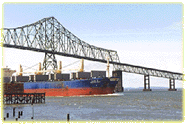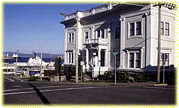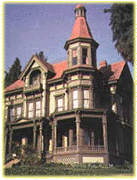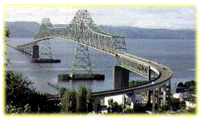 |
 |
 |
|
|||
|
The Open Road: Astoria
Teresa: We've been hearing rumors that Dungeness crab season has begun -- and Hal is a man on a mission. But first I talk him into taking in the lay of the land. Right now we're on Coxcomb Hill overlooking the town of Astoria. This is the site of the first permanent American settlement West of the Mississippi, a chapter of history commemorated by the Astoria Column. I expected to find an impressive marker here, but I've never seen anything like this pillar: a tall, slim candlestick tower that soars twelve stories above us. An incredible fresco spirals up its walls, telling the story of the area from native wilderness through the visit of Lewis and Clark, through settlement and the coming of the railroad. But the real treat, we've been told, is to look out from the top, so we enter the tower and start climbing. Teresa: The tower is 150 feet high, the spiral staircase has 164 steps. But who's counting? Hal: I can make it... Teresa: I don't know. Maybe I should have fed him first. Hal: Oh my gosh...the Columbia river, the ocean, the town of Astoria...sitting below Oh my gosh. Teresa: If we weren't already panting from the climb, the view would take our breath. We look out on a glittering blue paradise: the mouth of the Columbia and the vast Pacific beyond, the complicated shoreline with its bays and inlets and coastal lakes, the graceful sweep of the Astoria bridge linking Oregon and Washington, and behind us the snow-capped peak of Mount Rainier and what's left of Mt. Saint Helens. Astoria itself is picturesque, built into a steep hillside overlooking the sea, and populated today by the descendants of Finns and Norwegians and Swedes who adapted their native fishing cultures to the American Northwest, bringing along, too, their culture and music. Some of the original sea captains' homes have been refurbished as bed and breakfasts, and guests can take in the view from one of the old widows walks, looking down on the harbor with its lines of fishing boats, one of the best maritime museums in the country, and a host of restaurants and seafood outlets offering the catch of the day. Hal: Seafood -- now there's an idea.
Hal: We find our way to the Sanctuary Restaurant and meet Joanne Leech, who's about to cook the fall's first catch of Dungeness crab. We're now across the Columbia River in the town of Chinook, Washington. They call this eatery the Sanctuary because it's housed in the chapel of a refurbished turn of the century Church. Its a great place for tourists in the know because the locals love it here. Unfortunately, the restaurant's closed to the public tonight. Joanne is cooking for the Columbia River Crab Fisherman's annual dinner. But hospitality prevails, and she and her husband Geno invite us into the kitchen. Hal: Joanne is fixing one of her favorite recipes - - a special crab puff appetizer. Hal:- so you've got red pepper--
Teresa: It's deliciously simple. First, Joanne prepares a mixture of spices and cream cheese, while the fresh crab boils on the stove. Joanne: I'll leave the lid cocked... Sanctuary Restaurant Crab Puffs (Profiteroles) Choux Paste Shells (recipe below) Mash until soft:
Add:
Choux Paste Shells (savory) Preheat oven to 400 º
Procedure: Put water and butter in a heavy medium size pan. When mixture boils, pour in flour, cumin, garlic, and onion powder all at once. Stir until paste pulls away from the sides of the pan. Remove from heat and let cool slightly. Put mixure in processor. Add eggs one at a time processing well after each addition. Drop paste from teaspoon on parchment lined pan (or use pastry bag) Bake for 10 min at 400 º. Reduce heat to 350º and bake for about 25 minutes longer or until firm. Cool shells and partially split for filling. Sprinkle tops with parsley and basil chiffonade. Hal: Food and its presentation have always been important to Joanne's family. Joanne's fisherman father, John Friberg, emigrated here from Sweden in the 1920s and is a legend in the community. It's said that in even the worst storm at sea, he insisted that his coffee be served in a bone china cup and saucer. Now, at 96, he still prefers fried oysters to any other dish. Fresh seafood and good Swedish cooking had more than a little to do with Geno and Joanne's courtship. Geno: The first thing impressed me down at their house at Christmas time they lay out these banquet tables with...they laid out newspaper on the table and they bring in and fill that table up. And everybody's got a little hammer and bang away you go. It looks pretty impressive...I said this is a good place to hang around. Hal: Geno Leech did hang around, quitting his globe-trotting life as a merchant marine. He says he became a fisherman so he could understand what Joanne's family was talking about at the dinner table. Teresa: Meanwhile, preparations for tonight's dinner have shifted into high gear. Joanne oversees her scurrying staff.
Teresa: The crabs have cooked for fifteen minutes. Now the meat is removed from the shell and Joanne adds it to the cream sauce. Then she spoons the mixture into small, puffy pastries. Other appetizers are being prepared for tonight, but Joanne knows that the crab fishermen will be most critical of this dish made from their life's work. Joanne: Aaah...this looks yummy, even if I do say so myself.... Oh boy, that's really good. Teresa: Soon, the guests, the crab fishermen and their wives, arrive at the Sanctuary. After a brief meeting they descend on the appetizer table like seagulls on a landfill. The cooks listen through a crack in the kitchen door to hear if their efforts have paid off. Joanne: Doesn't get any better than that. Teresa: The genial group sits down and digs into the main course: prime rib with all the fixing. After handling fish all week, they're hungry for beef. At the end of the meal, it's storytelling time. They all tilt back in their chairs and coax Geno to serve up his own special desert: poems from the fishing life, verses he has written about people they all know, scenes they've all seen, and tales they've all heard before. Geno: Well this one's about Terry Salem on the Panther. I went back fishing a few years ago with Blair Minor and Terry had the Panther then, so I wrote a poem about it: "Well, the veteran dragger Panther..." Hal: The bard of mariners, Geno holds the crowd in rapt attention. It's amazing how a poem can take a story about the lives of everyday people and make it timeless. The Panther's On the Prowl
Ted comes on the radio, says "We ain't doin' bad.
"We had seven baskets, Ted, but this lump's a little hairy,
The lump came up, the sky turned gray, and it began to blow
We went aboard the Panther, stepped inside the "Panther Lounge",
Well, Terry woke us up at five. He had the Panther purring,
The veteran dragger Panther still prowls the sea today, Br Wesley "Geno" Leech Hal: These fishermen are well-satisfied and not just by the delicious meal. They are nourished, too, by the blend of community and tradition: in the stories that dignify the danger, hard work and humor of their lives. This Thanksgiving, Teresa and I are thankful for the good fortune that brought us to this gathering, and for Joanne and Geno, who make everyone who comes through the door, neighbor and tourist alike, feel like an old friend. We're thankful for good food. Not just for those crabs who gave their lives, but for the cooks and for the ruddy faced fishermen who risk the high seas to bring this bounty ashore. And we're thankful, too, for the stories and the storytellers, and the way they bring us together. Geno: You see those bumper stickers that say the man with the most toys wins? To me it's, "The guy with the most stories wins."
|
 | American Public Media Home | Search | How to Listen ©2004 American Public Media | Terms of Use | Privacy Policy |

 Hal: Teresa and I have always wanted to follow the mighty Columbia to the coast, and we've had a great
day, driving through the magnificent Columbia Gorge and then past that beautiful city of bridges, Portland,
Oregon. We've finally reached Astoria and the Pacific, and frankly, I'm starved.
Hal: Teresa and I have always wanted to follow the mighty Columbia to the coast, and we've had a great
day, driving through the magnificent Columbia Gorge and then past that beautiful city of bridges, Portland,
Oregon. We've finally reached Astoria and the Pacific, and frankly, I'm starved.
 Joanne: Oh they're beautiful! My gosh...I didn't think they'd be this big this time of year. I can't wait to cook
them.
Joanne: Oh they're beautiful! My gosh...I didn't think they'd be this big this time of year. I can't wait to cook
them.
 Joanne: Red pepper, this is red onion...and I'll also do some fresh garlic and some celery sticks also.
Joanne: Red pepper, this is red onion...and I'll also do some fresh garlic and some celery sticks also.
 Hal: It's like a ballet in here with people dancing around each other in a genial way. When they have
something heavy or hot, they say 'coming through' in a hushed tone. The smells are great the sounds are
great.
Hal: It's like a ballet in here with people dancing around each other in a genial way. When they have
something heavy or hot, they say 'coming through' in a hushed tone. The smells are great the sounds are
great.
 The veteran dragger Panther is off the Willa-pa,
The veteran dragger Panther is off the Willa-pa,